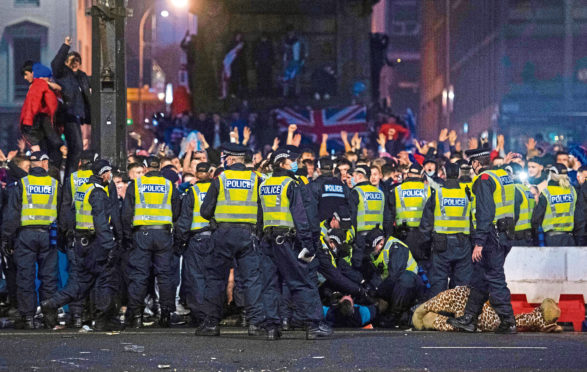
Most Scots have confidence in how Police Scotland has handled the pandemic, according to a survey.
Police Scotland received more than 36,000 responses to a year-long consultation which ended on Wednesday.
Public confidence has averaged at 57% with most respondents – 86% – feeling safe in their neighbourhood while 73% felt officers were friendly and approachable.
However, on average, only 44% of respondents said they fully backed Police Scotland’s approach to policing the pandemic, while 38% said that Police Scotland should take tougher action to ensure public compliance with restrictions.
Police officers were criticised for failing to break-up crowds of Rangers fans celebrating in Glasgow’s George Square after the club won the league.
When asked what Police Scotland could be doing better, answers seemed to reflect the current rates of Covid. During periods when infection rates were higher, people tended to want greater enforcement of coronavirus restrictions, increasing patrols and a focus on ensuring children and young people complied with restrictions. Speeding and dangerous driving linked to quieter roads was also a priority.
Assistant Chief Constable John Hawkins said: “The survey has been hugely successful in allowing us to look at what matters most to people and develop our policing approach to best serve our communities.
“Policing is founded on consent and our approach throughout the pandemic has not changed. We have asked our officers to use discretion and common sense to encourage people to save lives by following the coronavirus regulations.
“Public confidence remains high in policing and the survey results helped us increase our local presence where it was required. It has also provided the public with reassurance that we are adapting to the changes which the pandemic has brought, in particular how the public contact us.
“We have enhanced our digital contact and introduced an online reporting form and video appointments for the public to contact us. We also know communities were concerned about local beauty spots and areas which may attract visitors so we increased our patrols in these areas.”

Enjoy the convenience of having The Sunday Post delivered as a digital ePaper straight to your smartphone, tablet or computer.
Subscribe for only £5.49 a month and enjoy all the benefits of the printed paper as a digital replica.
Subscribe